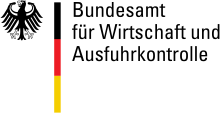Federal Office of Economics and Export Control
The Federal Office for Economic Affairs and Export Control (Bundesamt für Wirtschaft und Ausfuhrkontrolle, short BAFA) is a German federal agency. The BAFA is authorised to make the final decision on whether German goods are permitted for export.[2]
| Bundesamt für Wirtschaft und Ausfuhrkontrolle | |
 | |
| Agency overview | |
|---|---|
| Formed | 1954 |
| Jurisdiction | Government of Germany |
| Headquarters | Eschborn, close to Frankfurt |
| Employees | About 910[1] |
| Parent agency | Federal Ministry of Economics and Technology (Germany) |
History
The predecessor Bundesamt für Wirtschaft (BAW) (Federal Office of Economics) was founded in 1954. Its original name was Bundesamt für gewerbliche Wirtschaft (Federal Office for Industrial Economics). In 1975 it moved to Eschborn, where in 1975 the Bundesausfuhramt (Federal Office of Export) came into being. Eventually both offices got combined.[3]
Responsibilities
Foreign trade
The office oversees German exports in general and the export of weaponry and dual-use technology in particular.[4] The BAFA keeps detailed lists of goods which have to be scrutinized before a consent is possible. Hereby it considers embargos and international regulations such as the Chemical Weapons Convention and the Nuclear Suppliers Group.
On behest of the European Union the BAFA also enforces the Union's regulations concerning the import of specific goods including textile and steel.[5]
Moreover, the office supports countries outside the European Union in case they are about to establish their own export control systems.[6]
Promotion of economic development
The BAFA strives to improve the competitiveness of small and medium enterprises. It promotes management consulting, helps companies to present their products at international trade fairs etc.
Energy and environmental protection
The main goal is to promote efficient energy use as well as establishing a sustainable energy supply. The office's programmes for that matter pursue for example a growing use of cogeneration. This includes incentives for evolvements in the field of renewable energy on the grounds of solar thermal energy, biomass and heat pumps. The BAFA also offers professional certification for appropriate constructions and consultants for energy conservation.[7]
References
- "On 31 December 2016, 910 people were employed at BAFA" (PDF). Retrieved 2017-07-14.
- "Under the Foreign Trade and Payments Act (Section 44) BAFA is granted monitoring and inspection responsibilities for BAFA with the War Weapons Control Act" (PDF). Stockholm International Peace Research Institute. Stockholm. Archived from the original (PDF) on 2011-12-01. Retrieved 2011-07-06.
- "The Federal Office of Export Control and the Federal Office of Economics were merged to form the Federal Office for Economic Affairs and Export Control on 1 January 2001". German Federal Ministry of Economics and Technology. Berlin. Archived from the original on 16 June 2012. Retrieved 2012-06-08.
- "As its contribution to international peacekeeping, for example, the BAFA keeps a close check on the export of arms and munitions". deutschland.de, Das Deutschland-Portal. Berlin. Retrieved 2012-08-06.
- "The Federal Office for Economic Affairs and Export Control (BAFA) issues import authorisations and control documents in respect of certain goods from non-EU countries which are subject to an obligation of approval or control under EU regulations". europa.eu, European Commission. Retrieved 2012-08-06.
- Pietsch, Georg. "How to approach controls on intangible technology transfer (ITT)" (PDF). ExportControl.org, a web site officially sponsored by the Export Control and Related Border Security Assistance program. Washington. Retrieved 2004-11-03.
- "If you have specific questions about the "Market Incentive Programme" regarding the application for an investment grant, please send your inquiry directly to the Federal Office for Economic Affairs and Export Control (BAFA) in Eschborn". Federal Ministry for the Environment, Nature Conservation and Nuclear Safety (BMU). Berlin. Archived from the original on 2012-08-03. Retrieved 2012-08-06.